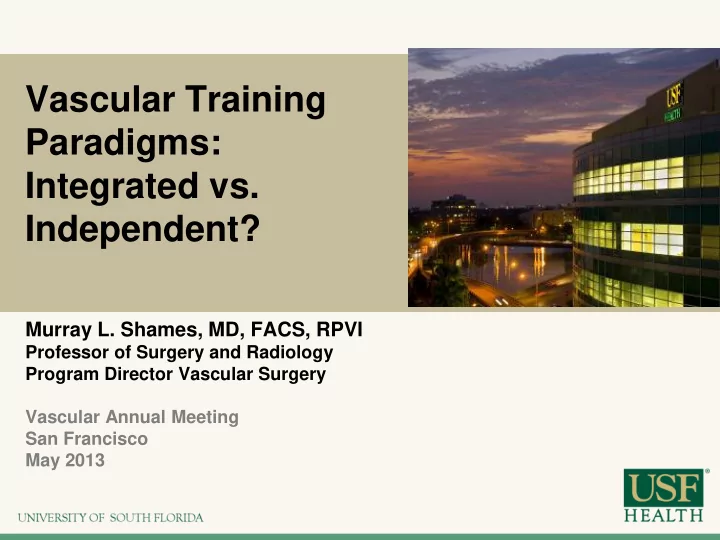

Vascular Training Paradigms: Integrated vs. Independent? Murray L. Shames, MD, FACS, RPVI Professor of Surgery and Radiology Program Director Vascular Surgery Vascular Annual Meeting San Francisco May 2013
Vascular Training Programs 0+5 track —Eligible for board certification in vascular surgery only. 4+2 Early Specialization Program (ESP) track —Eligible for vascular surgery and general surgery certification 3+3 track —Eligible for board certification in vascular surgery only. 5+2 track —Eligible for board certification in both general surgery and vascular surgery.
Traditional Vascular Training Vascular Surgery Fellowship Complete 5 years general surgery May include 1-2 years additional research Expected to have done 12 months during general surgery training 2 years clinical training in vascular surgery Board Certification in General and Vascular Surgery
USF Fellow Fellow Case Volumes Year
General Surgery Training Curriculum not standardized – Laparoscopy – Upper GI surgery – Colorectal Surgery – Breast – Bariatrics – Cardiac & Thoracic Surgery – Vascular Surgery – Trauma and Critical Care Eligible for General Surgery Board Certification
Reality of General Surgery Training There aren’t any more general surgeons. 70 - 80% of graduates seeking advanced fellowship. Unrealistic expectation – Too many areas of specialty – Too many advanced fellowships – Too many new tools Goal of current training is core principles “Surgery in General”. Plastic Surgery successful transition to integrated training.
Vascular Surgery is Changing
State of the Art Endovascular Interventions
Bypass Procedures – Gold Standard
Now Endovascular First Line
Why Develop an Integrated Program? Vascular fellows completing training do not practice general surgery Too much time spent on procedures vascular surgeons will never do – Laparoscopy – Endoscopy Eliminate need for a second application and match (time & $) More attractive sub-specialty residency – 40% of integrated residents are women(60% in our program) – Higher percentage AOA Will get better applicants – thus better residents – Higher USMLE – More publications Better way to train a vascular surgeon – Focused skill set Permit earlier, mastery of endovascular skills Increase number of vascular surgeons entering practice ONLY Vascular Board Certified
Critical Components Adequate case volume and distribution Multiple Sites/Services Faculty – Education – Research – Endovascular training – Simulation Control over Core Curriculum $$ Support
Potential Obstacles Dept. Chair GME Funding General Surgery Program Director General Surgery Residents Vascular Fellow’s
Integrated Residency Requirements 24 months General Surgery (core) Recommended to take general surgery in-service exam Required to pass SPE exam for eligibility for vascular boards 36 months Vascular & Endovascular Surgery Rotations are not standardized*** Must include vascular lab interpretation Final year all vascular Annual Vsite exam (changing to SPE site) Required RPVI Many programs have 1-2 year research requirement Required to take SPE exam(4 th year) and Vascular Written and Oral Exam
Infrastructure of the Integrated Residency Provide a CORE of surgical principles Detailed knowledge of Vascular Imaging – Angio – CT – MR Vascular Lab Vascular Medicine Endovascular Skills Traditional Vascular Surgery
Integrated Residency Rotation Schedule Jul Aug Sep Oct Nov Dec Jan Feb Mar Apr May Jun PGY1 General Gen’l Radiology Cardio Surgery Vasc Surgery Trauma Vasc Surgery APC Surgery PGY2 Cardiac Transplant Vasc Surgery Surgery Trauma Vasc Surgery General Trauma ICU Surgery Surgery PGY3 Cardiac Peds Vasc Surgery Trauma Surgery General Surgery Vasc Surgery Endovascular/ Surgery Vascular Lab PGY4 Vasc Vasc Vascular Surgery TGH Vascular Surgery VA Surgery Surgery FH FH PGY5 Vasc Vasc Vascular Surgery TGH Chief Vascular Surgery VA Surgery Surgery FH FH
Integrated Training Programs
Vascular Surgery in Florida Insufficient number of surgeons for population – estimated 18 million in 2010 – no vascular surgeon in many counties – ABS-VS certified surgeons perform 1/3rd of procedures Number of medical school graduates increasing – 450 “new” MD’s and DO’s each year Only three 2-yr training programs available in Florida 1 “integrated” vascular surgery training program
New Integrated Vascular Positions Feb RRC Approved – Beth Isreal Deaconess – MGH – Univ Iowa – Albany Medical Center – Charleston Area Medical Center Total 45 Programs and 52 Positions
Integrated Vascular Positions
2013 Integrated Vascular Match Approximately 200 Applicants 84 Applicants interviewed (49 US Seniors) 45 Matched (37 US Seniors)
Amongst Most Competitive Match
Independent Residency 104 Independent Programs (Fellowships) 2 New Programs – Michigan State University College of Human Medicine – University of Oklahoma School of Community Medicine (Tulsa)
Trends in Fellowship Match
USF Integrated Vascular Residency 0+5 format, approved February 2007 (1 year approval) 6 months general surgery each of first 4 years Transitioned to 4 months PGY 1-3 and final 2 years No extra research year initially, now with 2 nd position will offer 1 year research tract 2 senior year’s all in vascular surgery (to rotate with 5+2 fellows) Seamless integration with general surgery residency Maintained traditional fellowship (5+2) track 2008 - 5 year ACGME approval for both programs
USF Integrated Applicant Pool 2007 (ACGME approval) 2011 3 applicants (1 internal) 112 Applicants 2008 NRMP match 15 Interviewed (1 Internal) 2012 89 applicants 5 (5%) interviewed (internal 104 applicants candidate matched) 13 interviewed 2009 1 internal (Mich) 104 applicants (18% 2013 increase) 14 (13%) interviewed (0 – 90 applicants internal) – 16 interviewed 2010 – Matched 2 (1 internal) 106 applicants (stable) 28 (26%) interviewed (0 Internal)
Integrated Vascular Residents 1 st graduates last year – Stony Brook - stayed as faculty – USF – Complex Aortic Fellowship at Cleveland Clinic and staying on as faculty
Integrated Vascular Residency Allows early identification of specialty identity Integration with vascular fellows advantageous to both groups Shared call necessary with 80 hr/week schedule 2 senior years equivalent to fellowship with respect to chief responsibilities Independent Residency still a good alternative
Recommend
More recommend